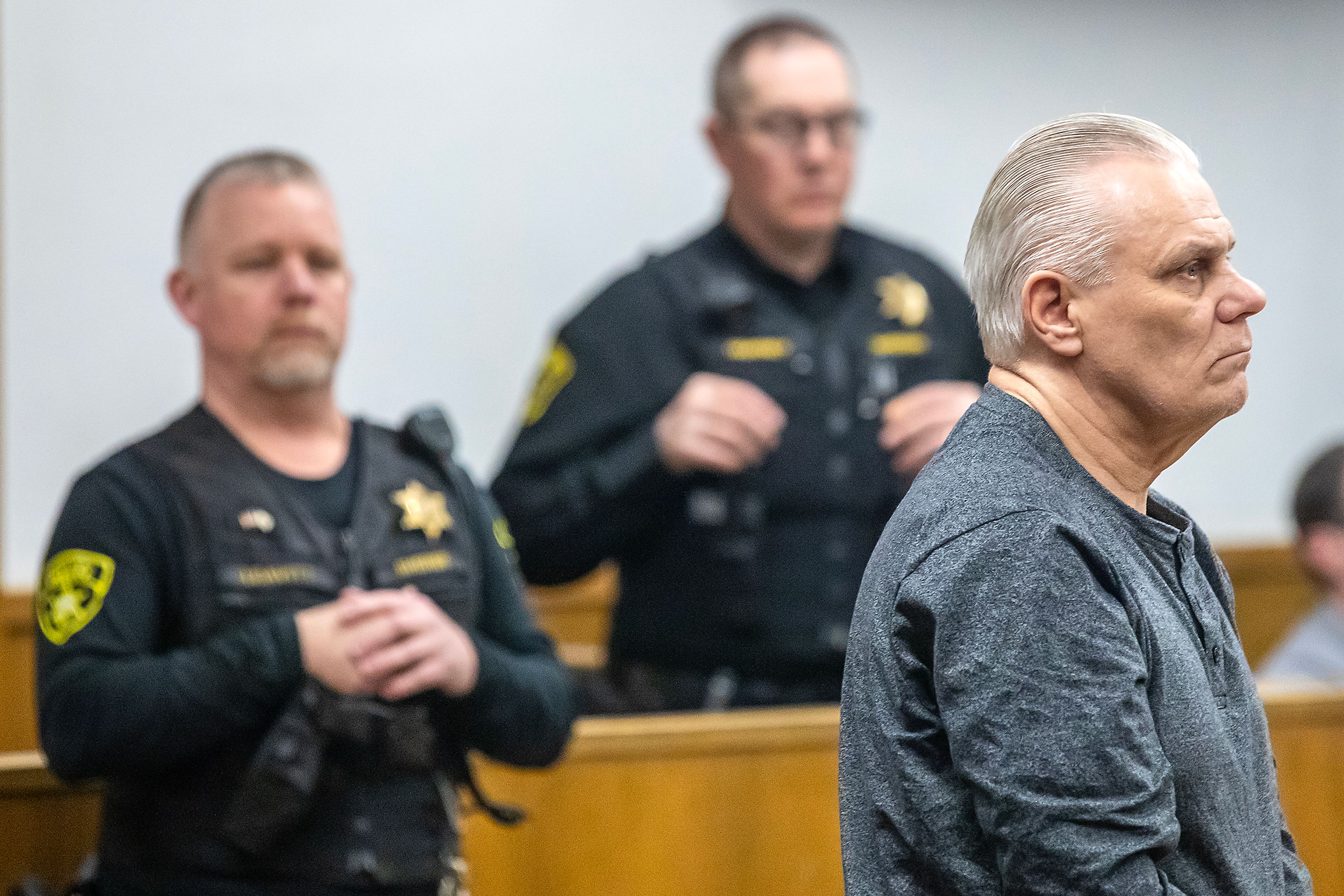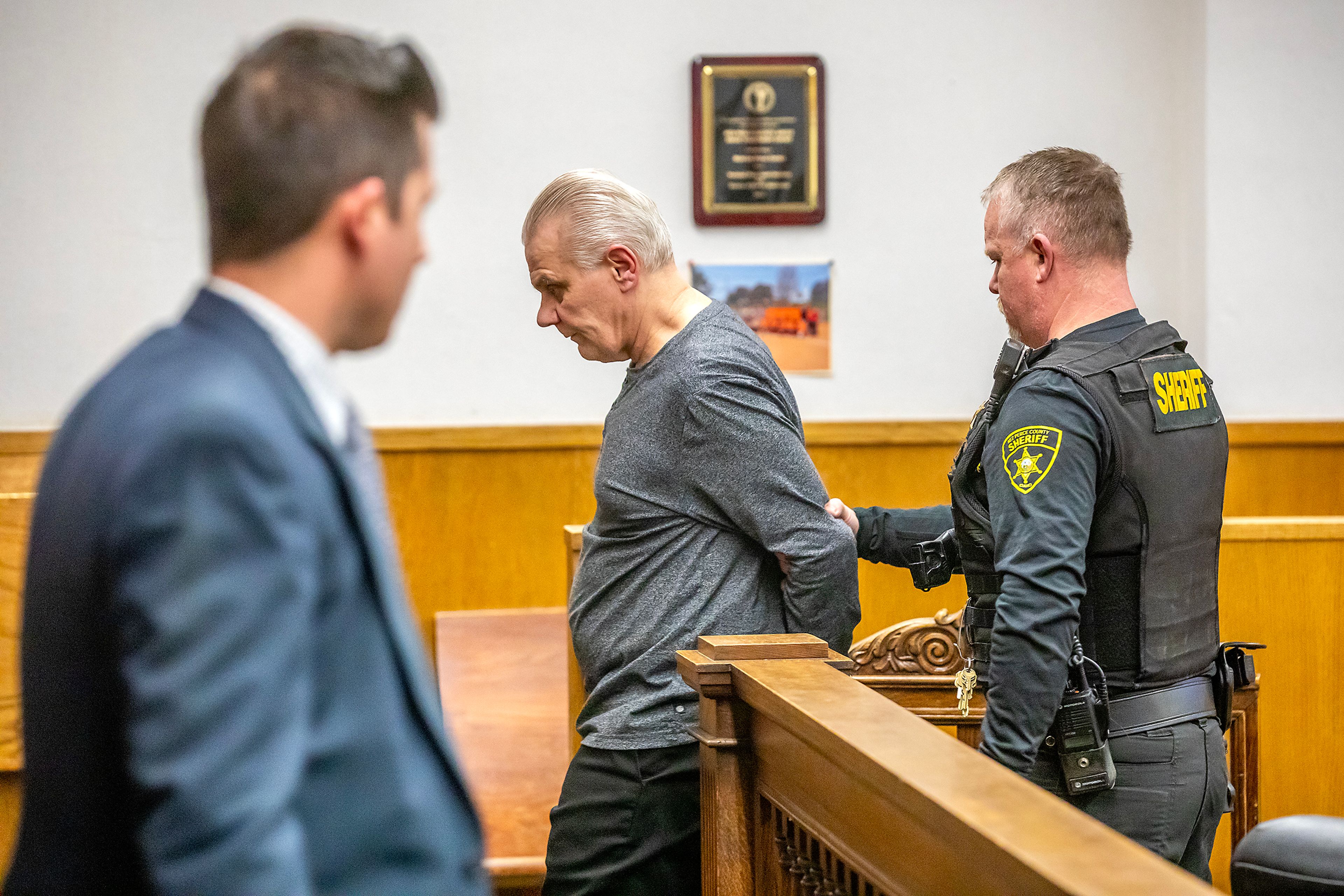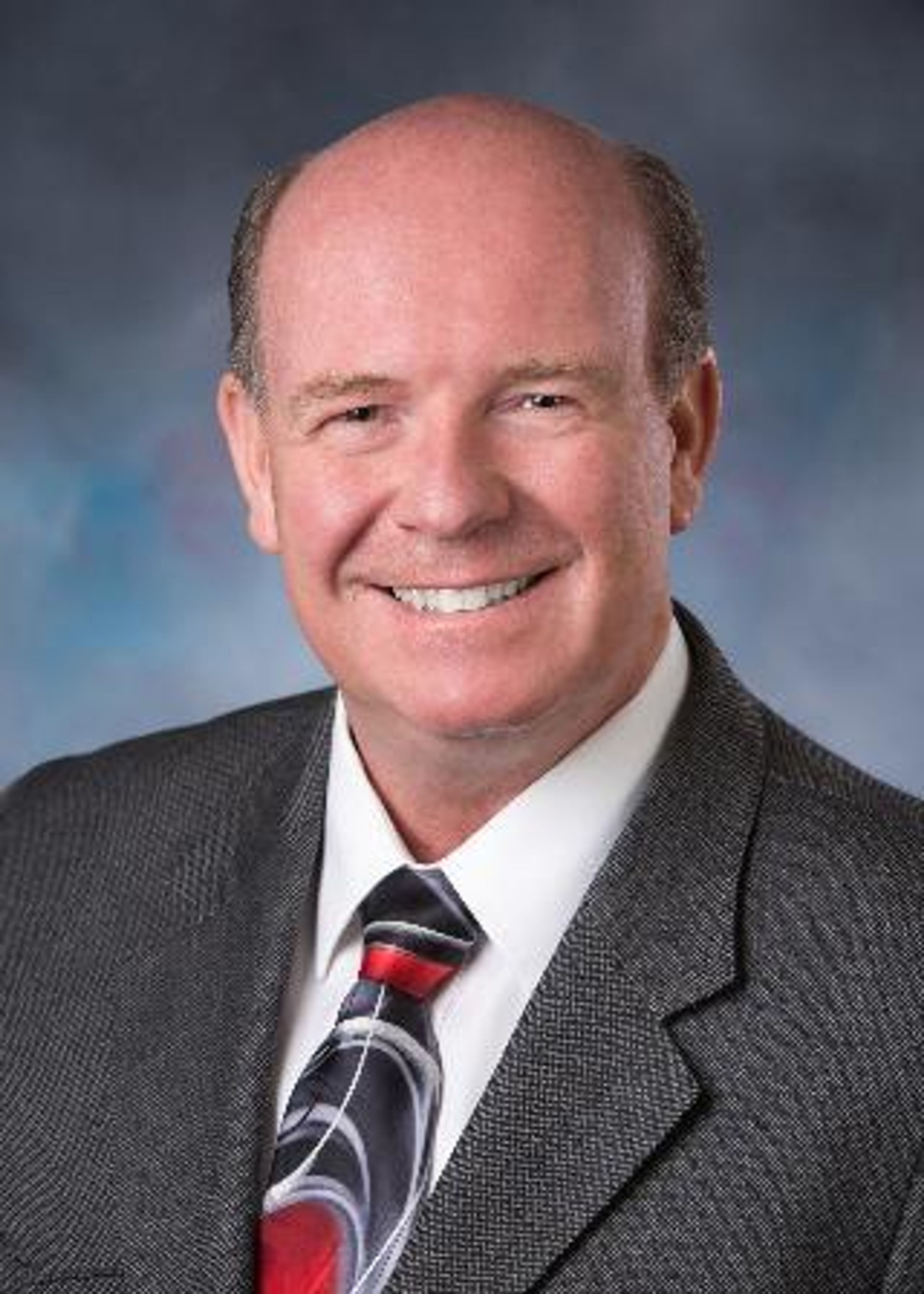Robert J. LaPlante was found guilty of attempted first-degree murder by a 12-member jury after a four-day trial — eight months to the day after the crime took place.
Attorneys presented closing arguments and the case was handed to the jury for deliberation Thursday at the Nez Perce County Courthouse. The jury, consisting of six women and six men, made its decision in about 70 minutes. There were about 20 people in the courtroom when the verdict was read, including friends and family of LaPlante, law enforcement and employees from the Nez Perce County Prosecutor’s Office.
LaPlante, 58, of Clarkston, was indicted by a grand jury for first-degree attempted murder for attempting to kill Loyal Otis Dickson Jr. by striking, stabbing and/or cutting him July 14 in North Lewiston. The jury had three options for deciding a verdict: attempted first-degree murder, attempted second-degree murder or aggravated battery.
The first-degree attempted murder charge required that the jury find the act was premeditated. Second-degree attempted murder doesn’t require premeditation, and the aggravated battery charge would have meant there was no intent to kill.
Second District Judge Mark Monson’s clerk and secretary Brittany Davenport received the verdict from the jury. LaPlante stood up as the verdict was read and faced the jury. Davenport read that the jury had unanimously found LaPlante guilty of first-degree attempted murder. Some family and friends of LaPlante looked down after the verdict was read.
LaPlante is scheduled to be sentenced at 8:30 a.m. May 15. A presentencing investigation report was also ordered.
“I want to thank the jury for holding Robert LaPlante accountable for the horrific attack on Otis Dickson,” said Nez Perce County Chief Criminal Prosecutor April Smith in a text. “Otis’s life has been forever altered because of the defendant’s senseless violence.”
She also thanked Lewiston Police Detective Cpl. Cody Bloomsburg, Detective Brian Erickson and the Lewiston Police Department for their tireless work in finding justice for Dickson. Erickson shook the hand of Bloomsburg shortly after the verdict was read.
Immediately after the verdict, the jury was given another matter to determine. LaPlante faced a persistent violator enhancement, which required a jury decision. Another verdict form was given to jurors to determine whether LaPlante had been convicted of burglary and possession of a controlled substance in July 2016 and was given a judgment of conviction as evidence.
The jury deliberated for about five minutes before deciding that LaPlante had two previous felony convictions. That will mean he can be sentenced as a persistent violator, and it increases the maximum penalty to life in prison. Attempted first-degree murder has a maximum penalty of 15 years in prison and a $50,000 fine.
The jury was then discharged. As it was leaving the courtroom, public defender Brennan Wright said LaPlante wanted to make a statement. LaPlante said that he filed a motion Dec. 26, which wasn’t heard, and he was wondering why.
Monson told LaPlante he could discuss the issue with his attorney because he wasn’t in a position to answer the question at the moment. Monson said that if LaPlante thought there was something additional that needed to be considered, he could file a written motion.
LaPlante was then handcuffed and taken out of the courtroom, and will be in custody at the Nez Perce County Jail until his sentencing.
With the guilty verdict, the state proved its case presented by Smith and Deputy Prosecutor Jazz Patzer that LaPlante and Timothy W. Allen went to Dickson’s camp, where he was attacked with a knife before Allen knocked him unconscious.
LaPlante then hit Dickson twice in the head with a high-lift jack, a 4-foot, 30-pound device. LaPlante then took Dickson’s wallet, ripping it from his pants. The two rolled Dickson up in carpet and Allen threw his knife in a drainage ditch.
Allen then drove Dickson’s red Dodge truck from the scene and LaPlante left in a white Chevy Impala. LaPlante was later detained by police in Clarkston, and he later identified himself and his hat in surveillance video.
Smith outlined the motive for LaPlante’s attack, saying his anger and hatred for Dickson had been “percolating” for years but came to a head when Dickson backed over the fence of his brother, Rodney LaPlante, with his vehicle the night before the attack. Dickson also owed Rodney LaPlante money and the red Dodge truck was from Rodney LaPlante.
In closing arguments from Smith and Wright, both highlighted the testimony of Timothy Allen as a reason to convict or acquit LaPlante.
Wright asked the jury to hold the right person accountable and suggested that Allen wasn’t a reliable source. He said Allen had just been released from prison and was using methamphetamine during the attack. He had admitted to attacking Dickson and knocking him unconscious.
Wright noted that Allen received a deal from the prosecutor’s office to testify against LaPlante and receive a lower charge of aggravated battery. He also highlighted the differences between his first interview with police, where he omitted his crime, and his second interview, where he changed his story and blamed LaPlante.
“He said what he needs to get what he wants,” Wright said.
Wright also suggested that the evidence didn’t support Allen’s version of events.
“The physical evidence doesn’t lie,” Wright said, repeating the phrase several times during his closing argument.
He said that although there was video surveillance, Dickson’s camp was out of frame and the attack wasn’t seen. He questioned why LaPlante had no blood on his hat or car if he was involved in the attack, given the amount of blood at the scene.
The salesperson at J&L Auto, where LaPlante went after the altercation, said LaPlante didn’t look beaten up, even though Allen testified that Dickson hit him several times with a knife. The knife found by law enforcement on Dickson also didn’t have blood on it. Wright offered an alternative explanation to scratches and bruises found on LaPlante as being from an altercation the night before.
Wright asked members of the jury how they knew it wasn’t Allen who’d attacked Dickson.
He told the jury to ask themselves, “Is Tim Allen really the guy I’m supposed to trust? Is Tim Allen the guy I’m supposed to rely on to make such an important decision?”
Smith explained to the jury why they could believe Allen’s testimony and find LaPlante guilty, because Allen’s story matched the evidence.
Smith also suggested that LaPlante had 17 hours before he was contacted by police to continue to cover up, remove and conceal evidence, which he already began to do at the crime scene.
She said that even though he gave his clothing to police, he wasn’t going to give officers the clothes he was wearing. Erickson had testified that the shoes LaPlante gave law enforcement didn’t match surveillance video.
In addition to the evidence matching Allen’s story, she also reminded the jury how he’d appeared on the witness stand, where he said he was remorseful and his apology to law enforcement for lying.
“He (Allen) took accountability for what he has done and now it’s your job to hold the defendant accountable for what he has done,” Smith said. “Everything that Tim Allen said is corroborated by independent evidence and that is how you know he is telling the truth.”
Brewster may be contacted at kbrewster@lmtribune.com or at (208) 848-2297.











